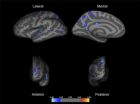(Press-News.org) Humans have a focus on the short term. We are more interested in a potential benefit if we can get it now.
The ability to delay gratification has been studied in children with the "marshmallow test": a child can have one treat now, or two if he or she can wait a few minutes without gobbling the first treat.
Psychologists and economists have shown that similar trends can be observed and measured in many spheres of life. They call the tendency for the perceived value of a delayed benefit to diminish "delay discounting."
Now researchers at Marcus Autism Center are studying delay discounting as it applies to parents' decision-making, when it comes to engaging in treatment for their children's problem behavior.
Their initial report is published in Journal of Autism and Developmental Disorders.
Lead author Nathan Call, PhD, director of Severe Behavior Programs at Marcus Autism Center, Children's Healthcare of Atlanta and assistant professor of pediatrics at Emory University School of Medicine, says his team's work is aimed at designing treatment programs that families can stick to, and helping them do so.
Call's co-authors were biostatisticians Scott Gillespie and Courtney McCracken, PhD in the Department of Pediatrics, Mindy Scheithauer at Marcus Autism Center, and Andrea Reavis, now at Trumpet Behavioral Health.
Effective behavioral treatments for children displaying problem behaviors exist, but immediate success is not guaranteed. On the part of parents, they require commitment, active adherence and work.
"It is not unusual for treatments for such severe problem behavior to
require implementation by caregivers for 6 months or more to achieve positive outcomes," the authors write.
"Here's the frustrating moment for me as a clinician," Call says. "It's my job to meet with parents, and develop strategies and programs that we think will work. At the start, parents are committed. If you ask them to say how important is it to you to address these problems, on a scale from 1 to 10, they will say '11', but within a couple months, some parents decide, 'We're not going to do this.' "
Call says that in response to signs of delay discounting, clinicians may be able to modify treatment programs to emphasize smaller, but more immediate treatment successes, or assign additional support resources if necessary.
In the new paper, Call and his team gave 17 parents a series of choices, one set based on monetary rewards and another set based on treatment for their child's behavior. The childrens' most common diagnosis was autism spectrum disorder, and the most common problem behaviors were aggression, disruptive behavior and self-injury.
In the test for monetary rewards, the choice was between $1000 after a delay, or a lesser amount immediately. Similarly, parents were offered a hypothetical treatment program that would stop their child's problem behavior. They could choose between a program that would be effective for 10 years and would start after a delay, and a program whose benefits would start right away but would last for less time.
"The value these participants placed upon the outcome of a treatment for their child's problem behavior consistently decreased the longer that outcome took to be achieved," the authors write.
To be sure, when treatment to reduce problem behavior works, the effects are gradual, frequently incomplete, and it is difficult to predict the degree of success with certainty. Call says his team's follow-up studies are taking these uncertainties into account. Additional research could examine whether delay discounting tends to vary according to the age of the child or other family factors.
"We're not surprised delay discounting appears in the realm of parental decision-making," he says. "Clinicians know this is a problem. But I think if we can measure it, we can possibly predict it or change it. Because so much is known about delay discounting in other areas, we can capitalize on that knowledge and use it to help us translate our findings into best practices."
INFORMATION:
Cyclone Hudhud made landfall in east-central India on Oct. 12 and caused a lot of damage and several fatalities as it moved inland and weakened to a remnant low pressure area. NASA saw those remnants on Oct. 14.
When NASA's Aqua satellite passed over Indochina, the Moderate Resolution Imaging Spectroradiometer or MODIS instrument provided picture proof that the remnants of Typhoon Hudhud were still over India, Nepal, and China. Aqua passed over the region on Oct. 14 at 08:05 UTC (4:05 a.m. EDT).
Infrared satellite imagery and multispectral satellite imagery indicated ...
On 3 October 2014, the European Medicines Agency (EMA) hosted a meeting with representatives of Rare Cancers Europe (RCE) to discuss RCE's recent publication of a consensus paper on the methodology of clinical trials in rare cancers (1).
Rare Cancers Europe (RCE) is a multi stakeholder initiative promoted by ESMO (representing healthcare professionals, patients and industry) dedicated to putting rare cancers on the European political agenda. In their consensus document, RCE argue that a higher degree of uncertainty should be accepted for regulatory as well as clinically ...
COLUMBIA, Mo. – Neurons are electrically charged cells, located in the nervous system, that interpret and transmit information using electrical and chemical signals. Now, researchers at the University of Missouri have determined that individual neurons can react differently to electrical signals at the molecular level and in different ways—even among neurons of the same type. This variability may be important in discovering underlying problems associated with brain disorders and neural diseases such as epilepsy.
"Genetic mutations found in neurological disorders ...
Under the rule of dictator Nicolae Ceausescu, thousands of Romanian children were placed in overcrowded orphanages with bleak conditions and minimal human contact. Even after the 1989 revolution, the legacy of institutionalization continued. Only recently has research and public concern over early childhood environments caused changes in policies.
University of Washington research on children who began life in these institutions shows that early childhood neglect is associated with changes in brain structure. A paper published this month in Biological Psychiatry shows ...
LEBANON, NH – The foundation of evidence-based research has eroded and the trend must be reversed so patients and clinicians can make wise shared decisions about their health, say Dartmouth researchers in the journal Circulation: Cardiovascular Quality and Outcomes.
Drs. Glyn Elwyn and Elliott Fisher of The Dartmouth Institute for Health Policy & Clinical Practice are authors of the report in which they highlight five major problems set against a backdrop of "obvious corruption." There is a dearth of transparent research and a low quality of evidence synthesis. ...
Researchers at Lund University in Sweden are testing a treatment for type 2 diabetes which targets the disease mechanism itself - and not just the symptoms. For the first time, knowledge about the individual patient's genetic risk profile is being used. The treatment completely restores the capacity to secrete insulin, which is impaired by the risk gene.
"The concept of treatment personalised to the individual's risk profile has great potential. Our results show that it is possible to block the effects of a common risk gene for type 2 diabetes", says Anders Rosengren, ...
Scientists from the University of York have released a report highlighting the gap between declining wild fish supplies and healthy eating advice recommending more seafood.
While the health benefits of eating fish have become better appreciated in recent years, many wild fish stocks continue to be overfished.
In a study published in Marine Pollution Bulletin, Dr Ruth Thurstan, now a Research Fellow at the University of Queensland, and Professor Callum Roberts, Professor of Marine Conservation at the University of York, used historical fisheries data and population ...
The results of their research have been published as the cover story of the renowned medical journal Cancer Cell.
Fatty liver disease – alongside fatty liver due to massive alcohol consumption – is mainly caused by excessive consumption of fat and sugar combined with a lack of exercise or a sedentary life style. This is referred to as non-alcoholic fatty liver disease (NAFLD). If NAFLD becomes chronic – e.g. through the constant uptake of high lipids and high sugar combined with lack of excercise a chronic inflammatory response is triggered in the liver ...
This news release is available in German. FRANKFURT Parkinson's Disease is the second most common neurodegenerative disorder. In Germany alone, almost half a million people are affected. The focus of the disease is the progressive degeneration of dopamine-producing nerve cells in a certain region of the midbrain, the substantia nigra. Misfolded proteins are the cause. Until recently, it was unclear why damage is confined to specific nerve cells. A team or researchers led by Frankfurt neurophysiologists has now defined how this selective disease process begins using ...
From an early age, the lungs of individuals with cystic fibrosis (CF) are colonised and infected by bacteria, a common example being S. aureus. These bacterial infections cause the lungs to become inflamed, infected, and can eventually lead to permanent lung damage. Researchers from the University of Pennsylvania and the Howard Hughes Medical Institute previously showed that an enzyme called Sphingomyelin phosphodiesterase C (SMaseC) produced by the S. aureus bacterium may harm the health of CF patients. Now, they have discovered an inhibitor for this pathogenic bacterial ...


